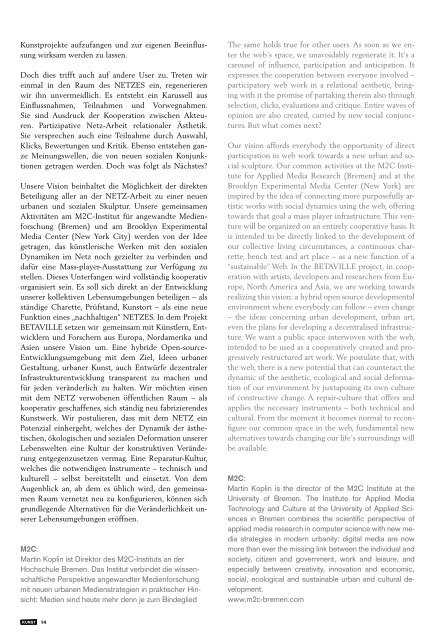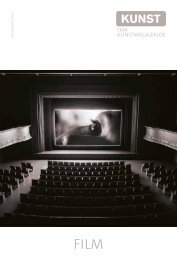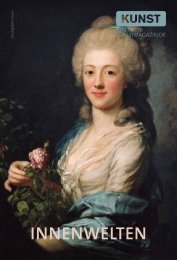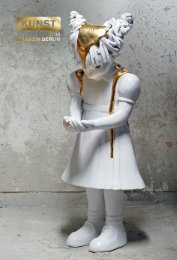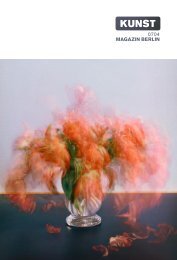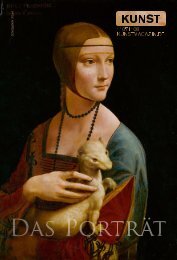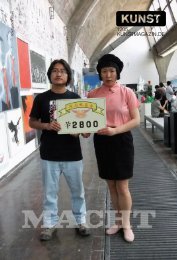Ausgabe Dezember 2009 - Sarah Weckert
Ausgabe Dezember 2009 - Sarah Weckert
Ausgabe Dezember 2009 - Sarah Weckert
Erfolgreiche ePaper selbst erstellen
Machen Sie aus Ihren PDF Publikationen ein blätterbares Flipbook mit unserer einzigartigen Google optimierten e-Paper Software.
Kunstprojekte aufzufangen und zur eigenen Beeinflussung<br />
wirksam werden zu lassen.<br />
Doch dies trifft auch auf andere User zu. Treten wir<br />
einmal in den Raum des NETZES ein, regenerieren<br />
wir ihn unvermeidlich. Es entsteht ein Karussell aus<br />
Einflussnahmen, Teilnahmen und Vorwegnahmen.<br />
Sie sind Ausdruck der Kooperation zwischen Akteuren.<br />
Partizipative Netz-Arbeit relationaler Ästhetik.<br />
Sie versprechen auch eine Teilnahme durch Auswahl,<br />
Klicks, Bewertungen und Kritik. Ebenso entstehen ganze<br />
Meinungswellen, die von neuen sozialen Konjunktionen<br />
getragen werden. Doch was folgt als Nächstes?<br />
Unsere Vision beinhaltet die Möglichkeit der direkten<br />
Beteiligung aller an der NETZ-Arbeit zu einer neuen<br />
urbanen und sozialen Skulptur. Unsere gemeinsamen<br />
Aktivitäten am M2C-Institut für angewandte Medienforschung<br />
(Bremen) und am Brooklyn Experimental<br />
Media Center (New York City) werden von der Idee<br />
getragen, das künstlerische Werken mit den sozialen<br />
Dynamiken im Netz noch gezielter zu verbinden und<br />
dafür eine Mass-player-Ausstattung zur Verfügung zu<br />
stellen. Dieses Unterfangen wird vollständig kooperativ<br />
organisiert sein. Es soll sich direkt an der Entwicklung<br />
unserer kollektiven Lebensumgebungen beteiligen – als<br />
ständige Charette, Prüfstand, Kunstort – als eine neue<br />
Funktion eines „nachhaltigen“ NETZES. In dem Projekt<br />
BETAVILLE setzen wir gemeinsam mit Künstlern, Entwicklern<br />
und Forschern aus Europa, Nordamerika und<br />
Asien unsere Vision um. Eine hybride Open-source-<br />
Entwicklungsumgebung mit dem Ziel, Ideen urbaner<br />
Gestaltung, urbaner Kunst, auch Entwürfe dezentraler<br />
Infrastrukturentwicklung transparent zu machen und<br />
für jeden veränderlich zu halten. Wir möchten einen<br />
mit dem NETZ verwobenen öffentlichen Raum – als<br />
kooperativ geschaffenes, sich ständig neu fabrizierendes<br />
Kunstwerk. Wir postulieren, dass mit dem NETZ ein<br />
Potenzial einhergeht, welches der Dynamik der ästhetischen,<br />
ökologischen und sozialen Deformation unserer<br />
Lebenswelten eine Kultur der konstruktiven Veränderung<br />
entgegenzusetzen vermag. Eine Reparatur-Kultur,<br />
welches die notwendigen Instrumente – technisch und<br />
kulturell – selbst bereitstellt und einsetzt. Von dem<br />
Augenblick an, ab dem es üblich wird, den gemeinsamen<br />
Raum vernetzt neu zu konfigurieren, können sich<br />
grundlegende Alternativen für die Veränderlichkeit unserer<br />
Lebensumgebungen eröffnen.<br />
M2C:<br />
Martin Koplin ist Direktor des M2C-Instituts an der<br />
Hochschule Bremen. Das Institut verbindet die wissenschaftliche<br />
Perspektive angewandter Medienforschung<br />
mit neuen urbanen Medienstrategien in praktischer Hinsicht:<br />
Medien sind heute mehr denn je zum Bindeglied<br />
The same holds true for other users. As soon as we enter<br />
the web’s space, we unavoidably regenerate it. It’s a<br />
carousel of influence, participation and anticipation. It<br />
expresses the cooperation between everyone involved –<br />
participatory web work in a relational aesthetic, bringing<br />
with it the promise of partaking therein also through<br />
selection, clicks, evaluations and critique. Entire waves of<br />
opinion are also created, carried by new social conjunctures.<br />
But what comes next?<br />
Our vision affords everybody the opportunity of direct<br />
participation in web work towards a new urban and social<br />
sculpture. Our common activities at the M2C Institute<br />
for Applied Media Research (Bremen) and at the<br />
Brooklyn Experimental Media Center (New York) are<br />
inspired by the idea of connecting more purposefully artistic<br />
works with social dynamics using the web, offering<br />
towards that goal a mass player infrastructure. This venture<br />
will be organized on an entirely cooperative basis. It<br />
is intended to be directly linked to the development of<br />
our collective living circumstances, a continuous charrette,<br />
bench test and art place – as a new function of a<br />
“sustainable” Web. In the BETAVILLE project, in cooperation<br />
with artists, developers and researchers from Europe,<br />
North America and Asia, we are working towards<br />
realizing this vision: a hybrid open source developmental<br />
environment where everybody can follow – even change<br />
– the ideas concerning urban development, urban art,<br />
even the plans for developing a decentralised infrastructure.<br />
We want a public space interwoven with the web,<br />
intended to be used as a cooperatively created and progressively<br />
restructured art work. We postulate that, with<br />
the web, there is a new potential that can counteract the<br />
dynamic of the aesthetic, ecological and social deformation<br />
of our environment by juxtaposing its own culture<br />
of constructive change. A repair-culture that offers and<br />
applies the necessary instruments – both technical and<br />
cultural. From the moment it becomes normal to reconfigure<br />
our common space in the web, fundamental new<br />
alternatives towards changing our life’s surroundings will<br />
be available.<br />
M2C:<br />
Martin Koplin is the director of the M2C Institute at the<br />
University of Bremen. The Institute for Applied Media<br />
Technology and Culture at the University of Applied Sciences<br />
in Bremen combines the scientific perspective of<br />
applied media research in computer science with new media<br />
strategies in modern urbanity: digital media are now<br />
more than ever the missing link between the individual and<br />
society, citizen and government, work and leisure, and<br />
especially between creativity, innovation and economic,<br />
social, ecological and sustainable urban and cultural development.<br />
www.m2c-bremen.com<br />
14


